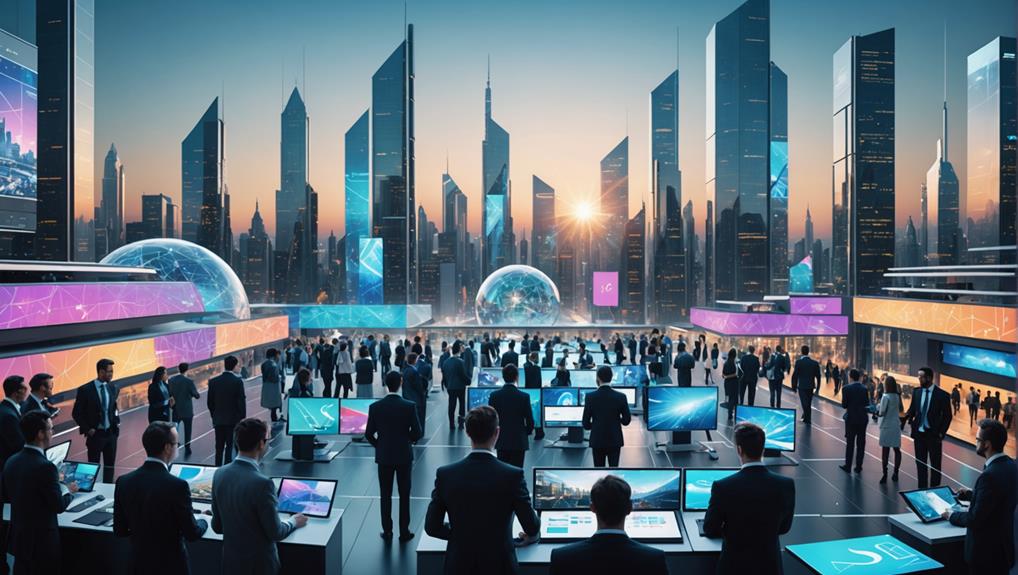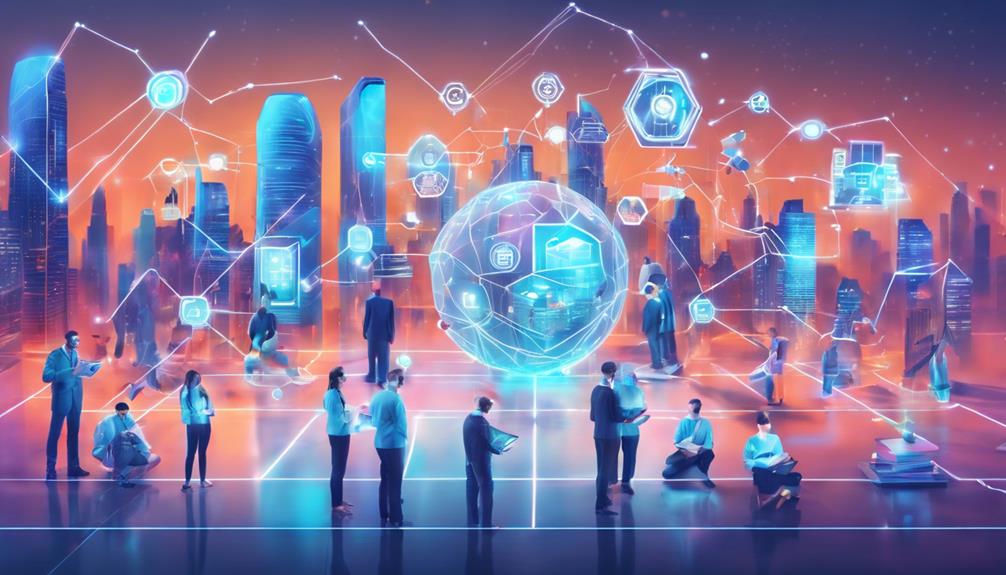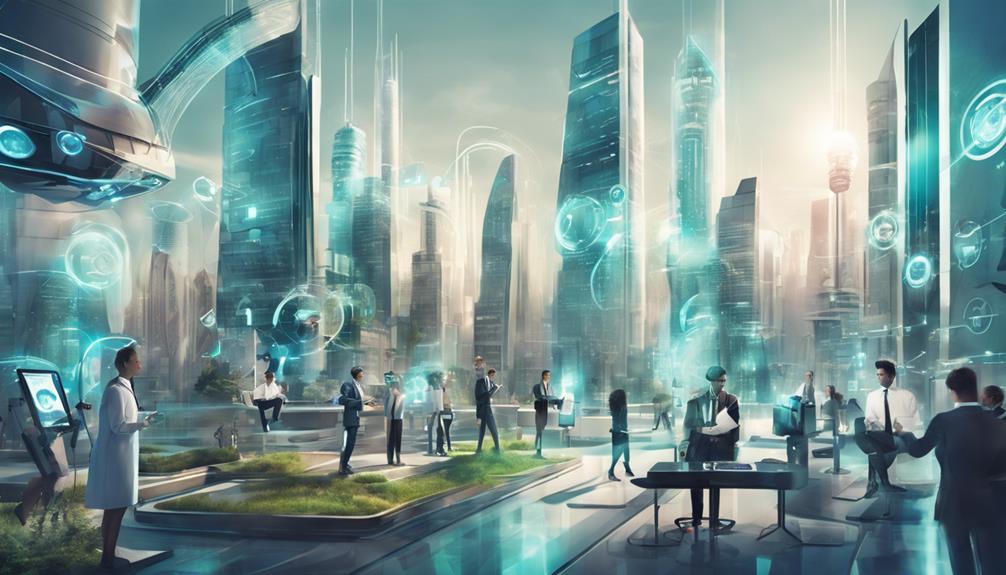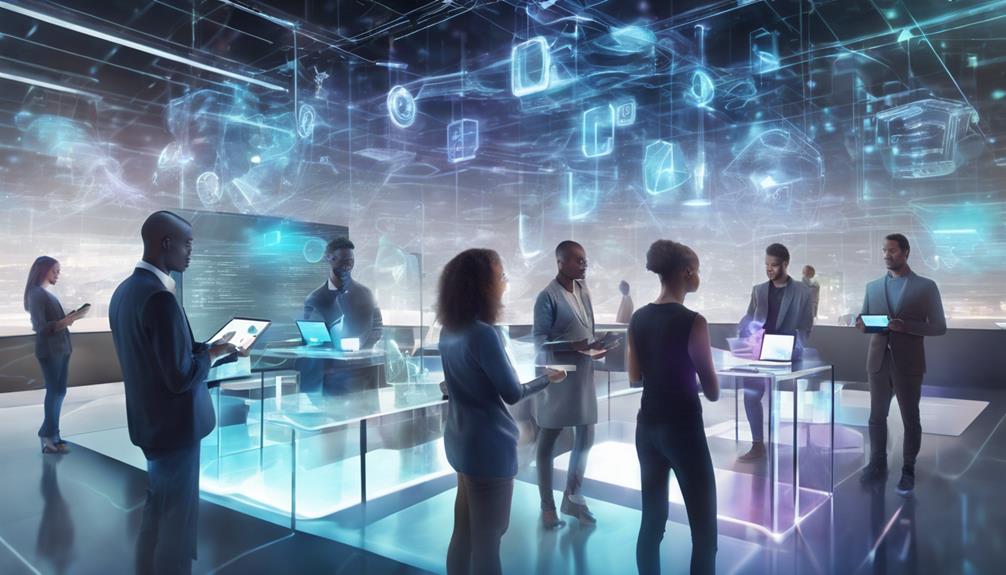
LinkedIn's future industry trends suggest a surge in sustainability practices, a solidifying of remote work, and a deep integration of technologies like AI and blockchain. You'll see more businesses integrating green initiatives and ethical practices due to consumer demand. Brands are increasingly adopting AI for enhanced customer interaction, while blockchain is set to elevate security and transparency. The shift to remote work is no longer a perk but a standard, requiring new skills, especially in digital communications. Considering these evolving aspects can bolster your professional strategies. Discovering more about these trends could significantly impact your career decisions.
Emerging Technologies to Watch

Innovation drives the pulse of the industry, constantly reshaping the landscape with each technological advancement. As you delve into LinkedIn's predictions, you'll find that AI and machine learning continue to top the chart of emerging technologies. These aren't just buzzwords; they're revolutionizing how businesses operate, analyze data, and interact with customers.
Next up, keep your eyes on blockchain technology. Beyond its initial fame in cryptocurrencies, blockchain is set to enhance transparency and security across various sectors, from finance to supply chain management. You'll see companies increasingly adopt this tech to ensure data integrity and build trust among users.
Don't overlook the rise of the Internet of Things (IoT). As devices become smarter and more interconnected, industries such as manufacturing, healthcare, and retail are harnessing IoT to boost efficiency and foster real-time decision-making. This isn't just about convenience; it's about leveraging data to optimize operations and predict trends.
Lastly, augmented reality (AR) and virtual reality (VR) are making waves beyond gaming. These immersive technologies are being employed for training, marketing, and even remote assistance, providing engaging experiences that bridge the gap between digital and physical realms.
Stay tuned as these technologies redefine what's possible in your industry.
Shifts in Remote Work Dynamics
As you navigate the evolving landscape of remote work, it's clear that the dynamics have shifted significantly in recent years. What once was a perk has now become a norm for many industries.
You've likely noticed more companies aren't only accommodating remote work but are also structuring their operations around it. This shift isn't just about where you work; it's reshaping how you work.
You're seeing teams spread across time zones, relying heavily on digital communication tools. Meetings have transformed with the rise of video conferencing, making face-to-face interactions less frequent but more focused.
You're tasked with maintaining productivity and collaboration virtually, which requires a robust digital infrastructure and a shift in management strategies.
Moreover, the traditional 9-to-5 workday is becoming more flexible. You have the opportunity to design your workday around your peak productivity hours, allowing for a better work-life balance.
This flexibility, however, comes with its challenges, such as setting boundaries and avoiding burnout.
Remote work has also democratized employment opportunities. You can now access jobs worldwide, no longer limited by geographic boundaries.
This opens up a diverse talent pool for companies and a broader range of job opportunities for you.
Sustainability and Green Jobs

While the remote work revolution continues to reshape the job landscape, significant growth is also seen in the field of sustainability and green jobs. As you're navigating your career path, it's crucial to understand how sustainability initiatives are becoming embedded in every industry.
Companies aren't just adopting green practices for branding but are also driven by regulatory policies and a significant shift in consumer preferences towards environmentally friendly products.
You'll find that careers in sustainability aren't limited to environmental organizations but span across various sectors including manufacturing, energy, and even finance.
Positions like sustainability consultants, renewable energy managers, and corporate social responsibility officers are on the rise. These roles focus not only on reducing carbon footprints but also on implementing practices that lead to long-term economic and environmental sustainability.
Furthermore, as you look to the future, skills in environmental compliance, green infrastructure, and sustainable supply chain management are becoming increasingly in demand.
Learning these skills can significantly boost your employability in this expanding field. So, if you're passionate about making a difference, the growing sector of green jobs offers a promising avenue to develop your career while contributing positively to the planet.
The Rise of AI in Industries
Nearly every industry today experiences the transformative impact of artificial intelligence (AI), revolutionizing how businesses operate and compete. You've likely noticed how AI streamlines operations, from automating customer service with chatbots to enhancing decision-making processes with predictive analytics.
It's not just about simplifying tasks; AI is reshaping the very core of various sectors, including healthcare, finance, and manufacturing.
In healthcare, AI assists in diagnosing diseases with astonishing accuracy, surpassing traditional methods in speed and precision. You might find it intriguing that AI algorithms can now analyze medical images to detect abnormalities that are sometimes overlooked by human eyes.
Meanwhile, in finance, AI algorithms help manage risk and detect fraud by analyzing patterns that would be impossible for humans to process as quickly or as accurately.
Manufacturing has seen a significant shift with AI's integration into supply chain management and predictive maintenance. This shift not only boosts efficiency but also reduces downtime and operational costs.
Imagine factories where AI systems predict machine failures before they occur, allowing for timely repairs that prevent costly disruptions.
AI's rise isn't just a trend; it's a pivotal force that's setting the stage for a future where intelligent machines become your everyday business partners, enhancing capabilities and transforming challenges into opportunities.
New Skills and Career Paths

The rapid evolution of AI across industries necessitates new skills and creates diverse career paths you might explore. As technology advances, you'll find that mastering AI literacy isn't just for tech professionals anymore. Every sector, from finance to fashion, now seeks individuals who can harness the power of AI tools to drive innovation and efficiency.
You'll notice an increasing demand for data scientists and machine learning specialists. These experts are pivotal in interpreting the vast amounts of data generated daily, transforming them into actionable insights that can propel businesses forward.
But it's not just about the data experts; there's also a growing need for professionals who can blend technical skills with sector-specific knowledge. For instance, AI application managers and user experience designers who can bridge the gap between technical solutions and user-friendly interfaces are becoming crucial.
Moreover, soft skills like problem-solving, adaptability, and ethical judgment are more valuable than ever. As AI reshapes industries, you'll need to navigate the ethical implications and continuously adapt to new challenges.
Health Tech Innovations
Health tech innovations are revolutionizing the way you receive medical care, making it more personalized and efficient than ever before. With advancements like AI-driven diagnostics, you're not just getting faster results, but also more accurate ones. These technologies can analyze vast amounts of data in seconds, identifying patterns that might be missed by human eyes.
Wearable technology is another area where you'll see significant changes. These devices continuously monitor your health metrics such as heart rate, sleep patterns, and activity levels, providing real-time data to both you and your healthcare providers. This means potential health issues can be flagged and addressed much sooner.
Telemedicine is also making huge strides. You can now consult with specialists from the comfort of your home, reducing the need for travel and wait times. This is particularly life-changing for individuals in remote or underserved locations.
Moreover, robotic surgery is becoming more prevalent, offering you more precision in surgical procedures, reducing recovery times, and minimizing risks associated with human error.
These advancements are just the tip of the iceberg. As technology continues to evolve, so too will the ways in which your health care is delivered, offering you unprecedented benefits and transforming healthcare services worldwide.
Changes in Consumer Behavior

Consumer behavior has shifted dramatically in recent years, influenced heavily by advancements in technology and changing societal norms.
You've likely noticed how digital platforms have become the main shopping venues, not just for tech-savvy millennials but for a broad demographic spectrum. The rise of social media and mobile technology means you're not only a buyer but also an influencer within your own networks.
You're now more informed than ever before. With access to endless data, reviews, and comparisons at your fingertips, your purchasing decisions are becoming more deliberate.
Brands aren't just chosen; they're scrutinized for authenticity, sustainability, and ethical practices. You want to know the story behind a product, who made it, and the environmental impact of your purchase.
Moreover, subscription models and personalized services have gained your favor.
Why? Because they cater directly to your needs and preferences, offering convenience and a sense of tailored service that traditional shopping can't match.
You value experiences over possessions, a trend that's steering companies to innovate more around services.
Frequently Asked Questions
How Does Linkedin Influence Policy Decisions on Tech Regulation?
You'll find LinkedIn influences tech regulation policy by leveraging its vast network to advocate for industry standards and privacy laws. It's a platform where professionals discuss, shape, and forecast regulatory trends effectively.
What Are Linkedin's Strategies for Combating Misinformation?
LinkedIn's strategies to combat misinformation include enhancing their algorithms, partnering with fact-checkers, and educating users on spotting false information. You'll see tighter content moderation and more tools to report misleading posts.
How Is Linkedin Addressing Diversity and Inclusion?
LinkedIn's tackling diversity and inclusion by implementing strategies that promote a broader range of voices and perspectives in its workforce. You'll notice enhanced training programs and partnerships aimed at increasing representation across all levels.
What Impact Does Linkedin Have on Small Businesses?
LinkedIn significantly boosts your small business's visibility and networking capabilities. You'll access a vast network, attract potential clients, and find valuable partnerships, enhancing growth and market presence. It's essential for competitive edge and innovation.
How Does Linkedin Protect User Data and Privacy?
You're likely wondering how LinkedIn safeguards your data and privacy. They use strong encryption, regular audits, and have clear data usage policies to ensure your personal information remains secure and private.
Conclusion
You're standing at the brink of dynamic changes across industries. Embrace emerging technologies and the surge in AI applications to stay ahead. As remote work evolves, refine your virtual collaboration skills. Sustainability isn't just a trend; it's a necessity, so gear up for green jobs. The health tech revolution will open new career paths, and shifting consumer behaviors will demand your adaptability. Dive into these trends to redefine your professional landscape and thrive in the future.






